- Trip taken by 13 survivors of German internee camp Bad Wurzach – 70 years on from is liberation
- Extra poignant for survivors as it will be the last time they take this trip
- Former internees will revisit the camp where they spent more than two years
- How Jersey and Bad Wurzach came to be twinned – read more below
ISLANDERS who were detained in Bad Wurzach internment camp during the Second World War had an emotional return this weekend to the German town where they were held captive for nearly three years.
On Sunday, the 13 surviving former internees, all of whom are now in their seventies and eighties, were accompanied by friends and family to make a poignant visit to the graves of 11 Islanders who died while they were held in the town’s castle, which was used as a prisoner camp for more than two years.
As the ex-internees tearfully laid red roses on the headstones, and the residents of the rural town – which is twinned with St Helier – laid white roses, a sobering silence filled the cemetery and for a moment only birdsong could be heard.
And for certain members of the group, the occasion was even more meaningful.

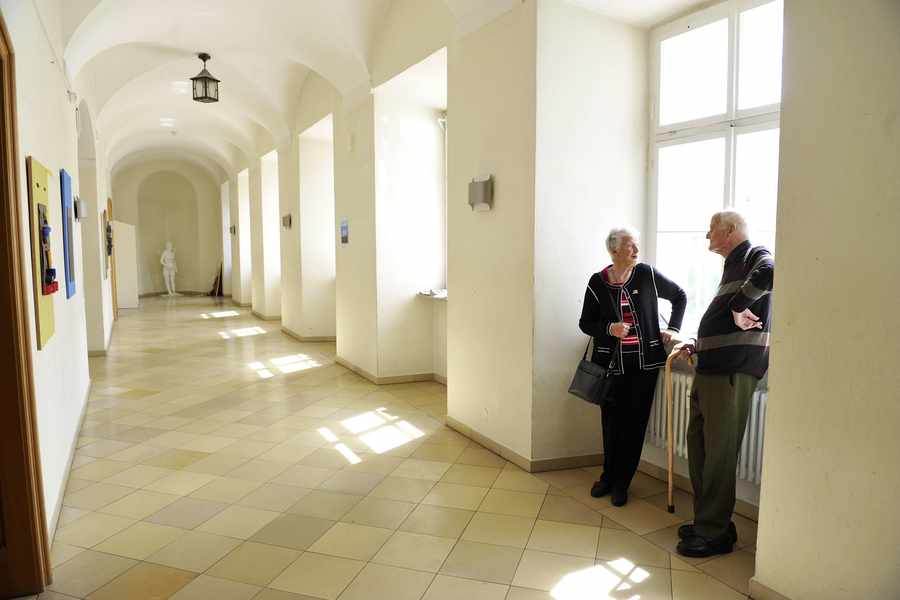
One of those people was Collette Falle, whose six-year-old sister Geraldine Barnes died from diphtheria while she was a child in the camp.
‘The support I’ve had from everyone, both the German contingent and the Jersey people, was absolutely marvellous. I was dreading going today – you try to hold it together but in the end the emotion just took over,’ Mrs Barnes said.
Tony Barnett, whose childhood friend Raymond Gould died after hitting his head on ice outside the camp, described the moment as ‘exceptionally moving’.
Earlier in the day, the 71-strong Jersey party were joined by members of the Bad Wurzach community for a special church service to mark 70 years since the camp was liberated by French troops.
Father Hubert Veeser lead the service, which featured hymns and addresses in both English and German, as well as a sermon from Island Reverend David Jones on the topic of reconciliation.
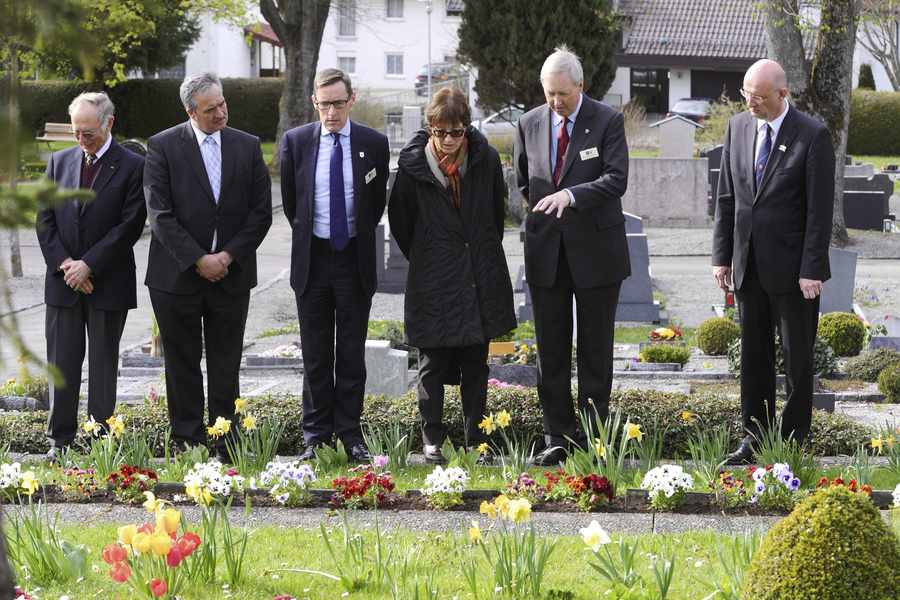
Following the service, wreaths were laid at a war memorial site by Bailiff William Bailhache, St Helier Constable Simon Crowcroft, Bad Wurzach mayor Roland Bürkle and the Jersey Red Cross.
During his speech the Bailiff said that it was a ‘privilege’ to honour the Islanders who were in the camp 70 years ago and those who died while they were in the camp.
Speaking after the ceremony, Chief Minister Ian Gorst said: ‘It is my second visit, and it’s always extremely moving. To think that out of such terrible times, today we stand as a community together with that idea of courage, forgiveness, reconciliation, and we look around the world that we live in today and those are characteristics that we need more than ever. The internees and the people of Bad Wurzach have shown what those characteristics can deliver together.’
The former internees are tomorrow due to re-visit the camp where they, among 600 other Islanders, were imprisoned from November 1942 until April 1945.
IN SEPTEMBER 1942 more than 2,000 Channel Islanders – men, women and children – were given 24 hours’ notice that they were to be forcibly deported to civilian internment camps in Germany.
The deportation orders applied to British-born men in Jersey and Guernsey between the ages of 16 and 70 and their dependants, and came directly from Adolf Hitler in retaliation for the British internment of Germans in Persia, now Iran.
This set in motion a chain of events that forged enduring friendships between wartime enemies and which culminates this week as 17 survivors of the 618 internees deported from Jersey join the people of the German town of Bad Wurzach to celebrate the liberation of an 18th-century castle that was a prison camp for more than two years.
It is likely to be the last trip back for many of the former internees, and probably the final time the town will mark the anniversary on such a grand scale.
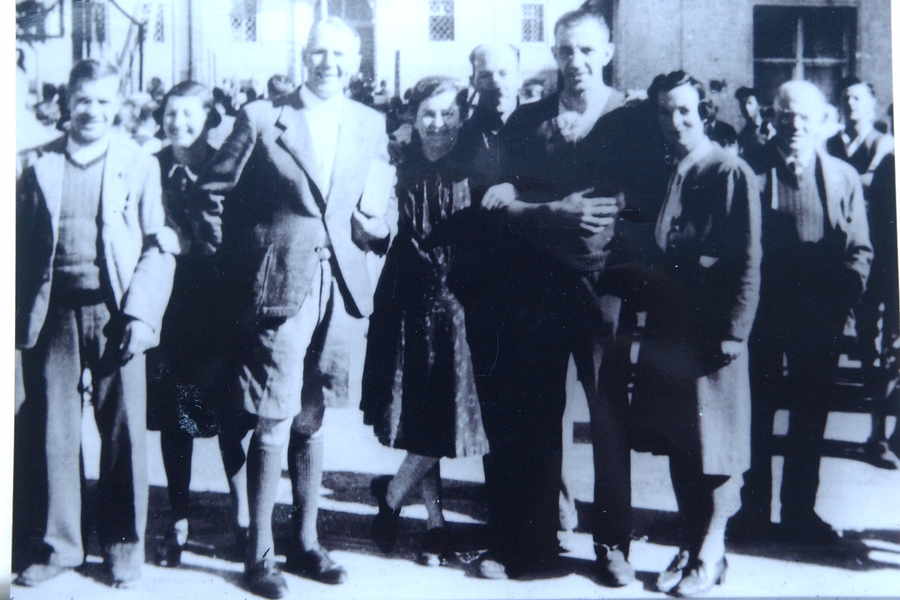
Tomorrow a 71-strong party from the Island led by the Bailiff and including ex-internees, their children, grandchildren and great-grandchildren, will commemorate the day, 70 years ago, when the camp was liberated by the French army.
The events planned for the former internees’ return are in marked contrast to the shock that met the notices printed in the Jersey Evening Post and the Guernsey Press in 1942 announcing their exile.
The deportation orders were met with official opposition in both bailiwicks, but they were acted on immediately, and as families, including babies and expectant mothers, were transported, walked or were pushed in prams to the Harbour, large crowds lined the town’s streets, offering support and cheering and clapping.
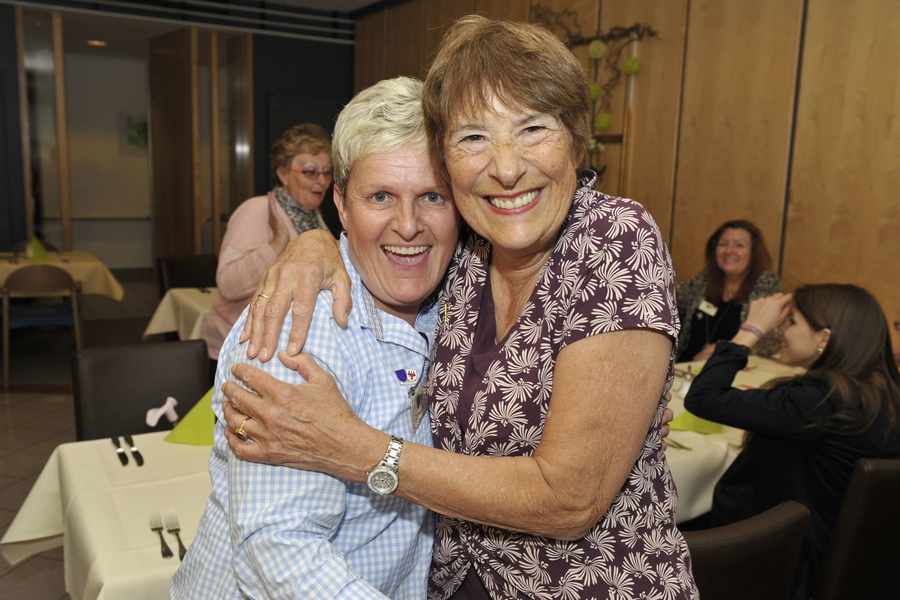
As the first boat left the Harbour for St Malo and a four-day train journey to southern Germany, encouraged by a large crowd that had gathered at South Hill, the deportees hid their fear by defiantly singing patriotic songs.
In total, 2,011 Channel Islanders were interned in Germany. The largest camp, in Biberach in the southern state of Baden-Württemberg, held about 1,000 inmates, largely from Guernsey. Most of the Jersey Islanders were held in an 18th-century castle in the centre of the neighbouring town of Bad Wurzach – until then cut off from the war – close to the Swiss and Austrian borders. Channel Islanders without dependants were interned at Dorsten in the Ruhr, Laufen in Bavaria and Kreuzburg in Breslau (now in Poland).
The inhabitants of Bad Wurzach were as horrified to see children imprisoned behind barbed wire just off their main street as the Jersey families were to find themselves so far from home.
After the initial shock, the Islanders settled into camp life, and while conditions were spartan, and in spite of living in fear of what the future may hold, the adults did all they could to protect their children.
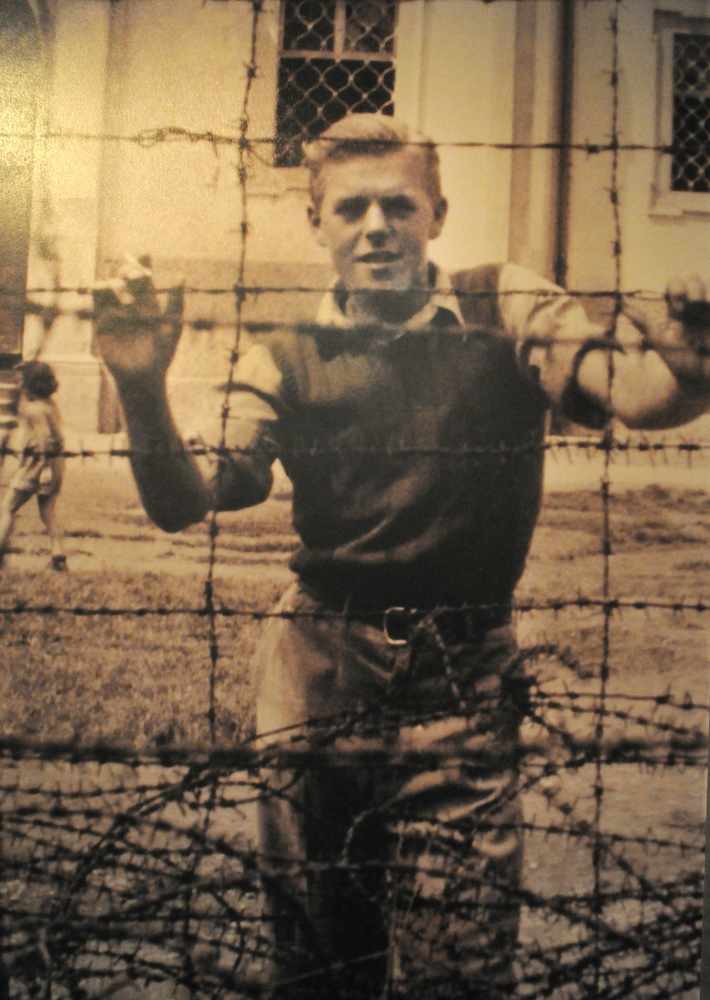
Peacetime skills such as plumbing and nursing were used to good effect, school lessons were held, concerts were organised for entertainment and children went for walks under guard outside the perimeter fence. But above all, they were not ill treated by the guards, and weekly deliveries of Red Cross parcels meant that they were better fed than those whom they had left behind in the islands as supplies became scarcer in the final year of the war.
And, in spite of the barbed wire that separated them, as camp rules and regulations were relaxed over time, friendships were formed between the prisoners and the townsfolk.
Twelve Islanders, including two children, died in captivity, though none died at the hands of their captors.
They are buried in the town cemetery, where their graves are tended to this day. In the first act of reconciliation between the communities of Jersey and Bad Wurzach, at the war’s end these Islanders’ names were engraved on the town’s war memorial alongside those of the local men who had fallen in the First and Second World Wars.
While the friendships formed in adversity endured and passed to successive generations, it would be 57 years before Jersey and Bad Wurzach were fully reconciled.
Attempts to twin St Helier and the German town failed owing to opposition from Islanders, but a ground-breaking Liberation Day speech in 2002 by the then Bailiff, Sir Philip Bailhache, in which he called for reconciliation, was the catalyst for the events that rapidly followed.
Two months later the formal twinning process was set in motion, with ceremonies in St Helier, at which the Mayor of Bad Wurzach, Roland Bürkle, asked for the Island’s forgiveness and referred to the ‘immense guilt’ harboured by his town and Germany towards the people of Jersey.






